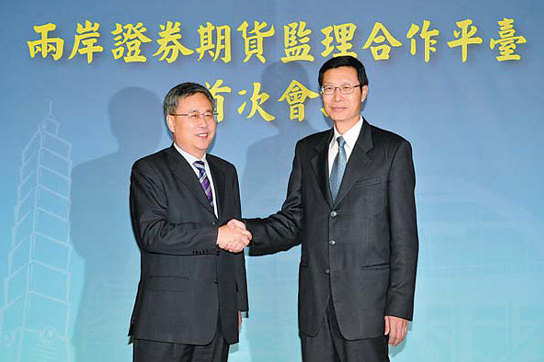A-share market opens to Taiwan investors
Updated: 2013-01-30 07:42
By Chen Jia (China Daily)
|
||||||||
|
Guo Shuqing (left), chairman of the China Securities Regulatory Commission, shakes hands with Chen Yuh-chang, chairman of the Financial Supervisory Commission, in Taipei on Tuesday. The mainland will open its securities and futures markets to Taiwan investors through the Renminbi Qualified Foreign Institutional Investor program. Chen Zhentang / For China Daily |
Mainland securities chief unveils proposal during landmark visit
The top securities regulator is ready to open the A-share market for Taiwan institutional investors holding offshore renminbi deposits, a senior official of the China Securities Regulatory Commission said on Tuesday.
The investment quota for renminbi qualified institutional investors, or RQFIIs, is likely to be 100 billion yuan ($16 billion), according to the commission.
Financial institutions from Taiwan will be able to hold as much as 51 percent, up from 49 percent, of the joint-venture brokerages' shares in Shanghai, Fujian and Shenzhen, said Tong Daochi, head of the international department of the commission, speaking in Taipei.
The commission is also considering allowing individual investors from the island to trade A shares on the Shanghai and Shenzhen stock exchanges.
The proposal was part of a policy package unveiled by commission Chairman Guo Shuqing during his first official visit to Taiwan which started on Monday.
The Shanghai Composite Index climbed 12.47 or 0.53 percent to 2358.98 at Tuesday's close, the highest since June 1, on news of the proposal.
Securities companies saw the largest increase compared with other sectors. China Merchants Securities Co Ltd hit the 10 percent ceiling, for the second day, on Tuesday.
Analysts said the internationalization of China's currency needs more offshore markets for support.
So far, the RQFII program only operates in Hong Kong. By the end of December, 24 financial institutions under the program had been approved, with a 67 billion yuan investment quota, according to the State Administration of Foreign Exchange.
Individual investors in Taiwan can directly invest in the mainland's dollar-denominated B-share market, and they can also buy yuan-denominated A shares through the qualified foreign institutional investor (QFII) program.
During the 18th National Congress of the Communist Party of China in November, Guo said that an increasing number of Taiwan's asset management companies will be welcomed to play a bigger part in the mainland securities market.
"Initial steps, such as underwriting stocks from the mainland, will be carried out in Taiwan," Guo said.
The pilot RQFII program is under the Economic Cooperation Framework Agreement, signed between the two sides of the Taiwan Straits to reduce tariffs and commercial barriers as well as tighten financial relationships, the commission said.
Some financial institutions in Taiwan have been granted RQFII licenses, according to the commission.
Guosen Securities Co Ltd noted that as investors from Taiwan directly participate in the mainland's capital market, financial ties between both sides are expected to tighten at a faster pace.
A report from the China News Agency said that Taiwan is also planning to ease the requirements for mainland companies issuing initial public offerings in Taiwan Stock Exchange.
Earlier this month, Guo looked forward to the likelihood that QFII and RQFII quotas will increase at least nine to 10 times.
This will be a huge capital injection into the mainland stock market compared with the current 80 billion yuan quota for QFII and 270 billion yuan for RQFII.
Jing Ulrich, managing director of global markets in China at JPMorgan Chase & Co, predicted that the QFII and RQFII quota expansion will likely speed up this year.
She said the QFII program may be ended after five or seven years, when the A-share market can completely open for the investors from all over the world.
"Currently, global investors are showing a more optimistic attitude toward China's stock market, as the economic growth is rebounding," said Ulrich.
chenjia1@chinadaily.com.cn
(China Daily 01/30/2013 page13)

 In Photos: 7.0-magnitude quake hits Sichuan
In Photos: 7.0-magnitude quake hits Sichuan
 Li Na on Time cover, makes influential 100 list
Li Na on Time cover, makes influential 100 list
 FBI releases photos of 2 Boston bombings suspects
FBI releases photos of 2 Boston bombings suspects
 World's wackiest hairstyles
World's wackiest hairstyles
 Sandstorms strike Northwest China
Sandstorms strike Northwest China
 Never-seen photos of Madonna on display
Never-seen photos of Madonna on display
 H7N9 outbreak linked to waterfowl migration
H7N9 outbreak linked to waterfowl migration
 Dozens feared dead in Texas plant blast
Dozens feared dead in Texas plant blast
Most Viewed
Editor's Picks

|

|

|

|

|

|
Today's Top News
Live report: 7.0-magnitude quake hits Sichuan, heavy casualties feared
Boston suspect cornered on boat
Cross-talk artist helps to spread the word
'Green' awareness levels drop in Beijing
Palace Museum spruces up
First couple on Time's list of most influential
H7N9 flu transmission studied
Trading channels 'need to broaden'
US Weekly

|

|








